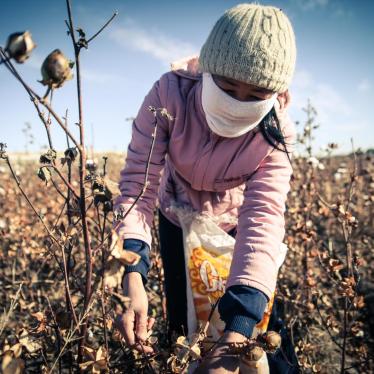(Tashkent, May 21, 2004) — A new torture death of a man in police custody in Uzbekistan on Tuesday is the fifth such death documented by Human Rights Watch since May 2003, when the United States last certified the country was making sufficient progress in human rights to qualify for U.S. assistance, Human Rights Watch said today. In the coming weeks, the U.S. State Department is due to again evaluate the Uzbek government’s eligibility.
Andrei Shelkavenko, 36, died while in detention at the Buston District Police Precinct in Gazalkent, near the Uzbek capital Tashkent.
“The government claims to be making progress on torture, but Shelkavenko’s death unfortunately shows otherwise,” said Rachel Denber, acting executive director of Human Rights Watch’s Europe and Central Asia Division. “The government should conduct a thorough and independent investigation into this death, allow international forensic experts to examine the body, and ensure that those responsible are brought to justice.”
A Human Rights Watch representative viewed Shelkavenko’s body and confirmed the injuries. Shelkavenko had an open, bloody head wound approximately 5 centimeters long on the left side of his scalp, along with abrasion and indentation on the right side of his neck, and a long wound to the back of his neck. He also had bruises on the underside of his right arm, and abrasions on the back of his shoulders.
Shelkavenko’s scrotum was unevenly blackened and swollen, and he had a long indentation at the top of his left thigh. He had a bloody wound on his right leg and scratches on the backs of his ankles.
Police arrested Shelkavenko on the night of April 23 on suspicion of murder. When his mother and sister went to the police station that night, an officer pointed a gun at them and threatened to shoot them if they came closer, while another yelled to other officers not to let them anywhere near the station. An officer later told Shelkavenko’s mother, “Your son is a murderer and has already confessed. You deserve to be shot.”
The next evening, a man came to Shelkavenko’s mother saying he had seen her son being beaten in the corridor of the police station the night before. Shelkavenko’s attorney was permitted to see him only on April 27 after filing a formal complaint. The meeting took place in the presence of the police chief and the head of the criminal investigation department. The lawyer reported to Shelkavenko’s family that he appeared to have been beaten. When his sister saw him on April 29, she observed that the side of his face was severely swollen, his jaw was cut and his chest was covered with haematomas. Shelkavenko told her that the injuries were the result of police brutality.
Relatives heard rumors of Shelkavenko’s death in the late afternoon of May 19 and called the police station, where officers confirmed that Shelkavenko had died at 4:30 that morning.
The authorities told Shelkavenko’s family that he died on the way to the hospital after attempting to hang himself from the bunk bed in his cell. Police in Uzbekistan commonly claim that suspicious deaths in custody are the result of suicide, even when experts have said that the victims’ injuries suggest the contrary, Human Rights Watch said.
Shelkavenko’s death comes as the U.S. State Department is about to decide whether or not to certify that Uzbekistan has made “substantial and continuing progress” on its human rights commitments, required to qualify the government to receive foreign assistance funds from the United States.
The Uzbek government claims to have made significant progress on combating torture, referring to a “Plan of Action” it adopted in March. The plan, however, fails to address many of the key recommendations issued by the U.N. Special Rapporteur on Torture following his visit to Uzbekistan in late 2002, including habeas corpus (or judicial review of detention). The government’s plan also emphasizes seminars and conferences, proposes little concrete action, and contains an unjustifiably delayed timeline for action on key reforms.
“This latest horrific death in custody further demonstrates the need for the international community to remain firm in the face of Uzbek government refusal to undertake serious, long-overdue reforms,” said Denber. “It’s time for the U.S. government to make clear to its Uzbek counterparts that it requires real reforms as part of its engagement.”
Last month, the European Bank for Reconstruction and Development did just that when it decided to limit investment in Uzbekistan over human rights concerns. Human Rights Watch called on the United States to follow suit and reinforce the EBRD’s decision by sending a strong and coordinated message to the Uzbek government about the need to see tangible progress in human rights.






